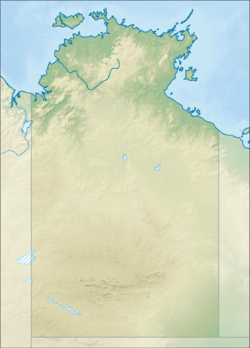Calvert River facts for kids
Quick facts for kids Calvert |
|
|---|---|
|
Location of the Calvert River mouth in the Northern Territory
|
|
| Country | Australia |
| Territory | Northern Territory |
| Physical characteristics | |
| Main source | Australia 273 m (896 ft) |
| River mouth | Gulf of Carpentaria, Australia 0 m (0 ft) 16°17′54″S 137°43′57″E / 16.29833°S 137.73250°E |
| Length | 222 km (138 mi) |
| Basin features | |
| Basin size | 10,333 km2 (3,990 sq mi) |
The Calvert River is an important river located in the Northern Territory of Australia. It flows through vast, mostly untouched areas.
Contents
Journey of the Calvert River
The Calvert River begins its journey on a flat area. This area is found between the Calvert Hills and a place called China Wall. From there, the river flows north.
It passes through mostly empty lands. It also goes through large farming areas known as pastoral leases. One of these is Calvert Hills Station.
The river eventually empties into the Gulf of Carpentaria. This is about 150 kilometers (93 miles) east of Borroloola. It's also quite close to the border with Queensland. The river is part of the Gulf Coastal bioregion.
How Much Water Does It Carry?
Every year, the Calvert River carries a lot of water. On average, it sends about 1,000 gigaliters (which is a huge amount!) of water into the sea.
Before reaching the ocean, the river flows through a special place. This place is called the Australian Wildlife Conservancy’s Pungalina-Seven Emu Sanctuary. It's a protected area for wildlife.
Rivers Joining the Calvert
Many smaller rivers and creeks flow into the Calvert River. These are called tributaries. There are fourteen of them in total.
Some of the main tributaries include:
- Bloodwood Creek
- Tobacco Creek
- Goanna Creek
- Pungalina Creek
- The Little Calvert River
Calvert River's Surrounding Area
The area that the Calvert River drains is called its catchment area. This area covers about 10,033 square kilometers (3,874 square miles).
It sits between the areas drained by other rivers. To the west is the Robinson River. To the east is Settlement Creek. To the south is the Nicholson River.
Life and Economy in the Catchment
There are no big towns in the Calvert River catchment area. In 2001, only about 103 people lived there. Almost half of these residents were Aboriginal people.
The river is not used for watering crops. It also does not have any dams. The main way people make a living here is by raising cattle. This is known as cattle grazing.
Amazing Fish of the Calvert River
The Calvert River is home to many different kinds of fish. In fact, 34 species of fish have been found here!
Some of the interesting fish you might find include:
- Glassfish
- Barred Grunter
- Snub-nosed Garfish
- Milkfish
- Fly-specked Hardyhead
- Treadfin Silver Biddy
- Flathead Goby
- Spangled Perch
- Barramundi
- Oxeye Herring
- Rainbowfish
- Black-banded Rainbowfish
- Northern Trout Gudgeon
- Bony Bream
- Catfish
- Spotted Scat
- Hyrtl's Tandan
- Freshwater Longtom
- Seven-spot Archerfish
- Giant Gudgeon
Also, a special kind of turtle lives in the upper parts of the river. It's called the Gulf snapping turtle. This turtle is considered endangered, meaning it's at risk of disappearing.
History of the Calvert River
The land around the Calvert River has a long history. The traditional owners of this area are the Garawa peoples. They have lived here for thousands of years.
How the River Got Its Name
The Calvert River was named in 1845. This happened during an expedition led by Ludwig Leichhardt. He was exploring from Queensland all the way to Darwin.
Leichhardt named the river after a man in his group, John Calvert. He did this to thank John Calvert for his excellent help during the expedition.
 | Isaac Myers |
 | D. Hamilton Jackson |
 | A. Philip Randolph |


